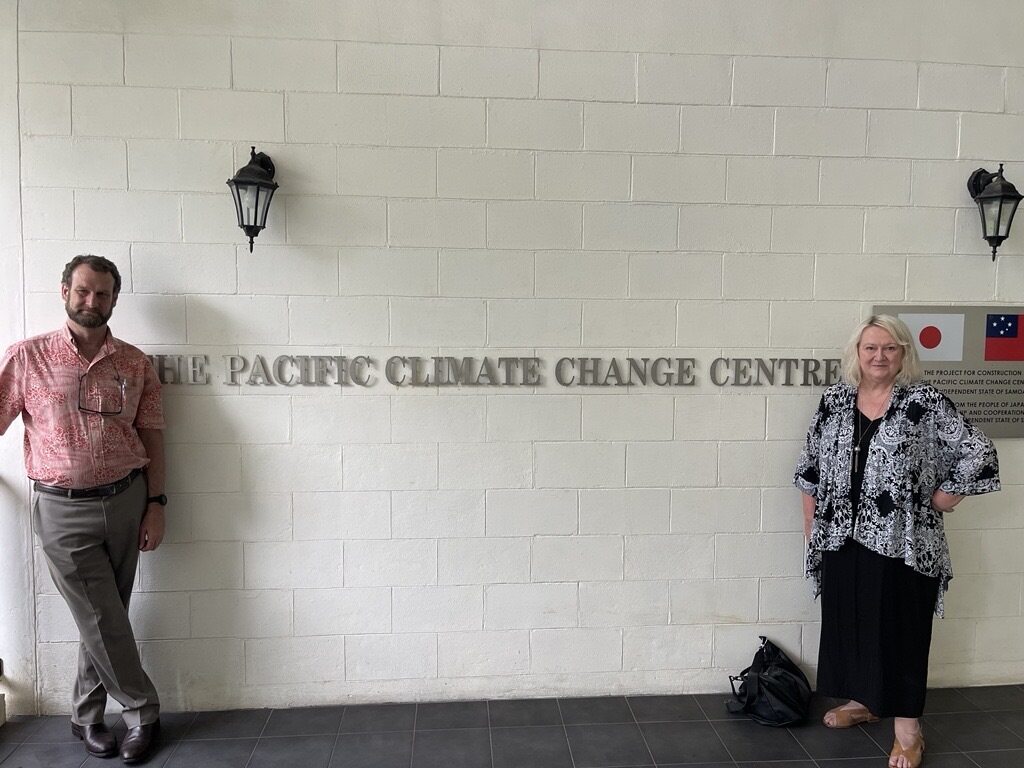University representatives visit Samoa to strengthen collaboration with Pacific partners
University representatives recently returned from a week in Samoa where they engaged with several key partners to strengthen our Pacific Node collaboration activities.
The Pacific Node is a University initiative co-created with our partners in the Pacific to enhance capacity in the region in key areas of environment and climate change resilience, ecosystem protection, waste management and pollution control, environmental governance, public health, and inclusive education by building collaborative research networks between regional partners, government, the private sector and academia.
Deputy Vice-Chancellors Professor Zee Upton (Research and Innovation) and Professor Kent Anderson (Global Engagement and Partnerships) joined Dr Sascha Fuller, Pacific Engagement Coordinator, for the trip.
The Newcastle team were welcomed to the village of Moata’a with a traditional ‘ava ceremony.
Here, the University works with the village on the Moata’a Living Lab project, which aims to conserve and regenerate the local mangrove environment and culture through a research program of activity and student mobility programs. Dr Fuller leads the project in collaboration with the Secretariat of the Pacific Regional Environment Programme (SPREP), the Samoan Ministry of Natural Resources and Environment and academics from The University of Newcastle and the National University of Samoa (NUS).
Dr Fuller spoke about the importance of the partnership with the Moata’a community, saying the project, “presents an incredible opportunity for our academics and students to work on finding solutions to real-world problems through knowledge exchange and mutual learning with a Samoan community.”
The representatives also visited the Pacific Climate Change Centre at the SPREP campus in Apia, Samoa, to formalise collaboration around the potential for a new Pacific doctoral training program and opportunities to access renewable energy technologies. They discussed the need to accelerate research developments in climate science, capacity development, climate adaptation and mitigation solutions to ensure the future prosperity of the Pacific region.
Other activities included conversations with representatives from the Scientific Research Organisation of Samoa where we will establish a Memorandum of Understanding (MOU) to build research capacity in areas of food science, post-harvest technologies, environment and renewable energy, a meeting with the Deputy CEO of Ministry of Education, Sport and Culture where we will develop an MOU to support capacity development in inclusive education, a meeting with the newly appointed Vice Chancellor of NUS, and a meeting with the University of the South Pacific to establish a student exchange program.
The trip was a valued opportunity to gain insight from our partners to start developing an updated Pacific Research Roadmap.
Dr Fuller said, “The visit to Samoa by two of our DVCs reinforced the University’s commitment to the Pacific region and strengthened our partnerships. The co-design of our Pacific Research Roadmap with our valued partners is integral to sustainable outcomes for the region aligned to our own priorities – equity, excellence, engagement, and sustainability.”
The roadmap will outline how we will build collective capacity by strengthening the Pacific Node scholar program and guide priorities to continue delivering cooperative and sustainable solutions to complex challenges faced by Pacific Island people in critical areas of environmental need and national priority.

Related news
- Launch of the School Students’ Statement on the Right to a Healthy Environment
- Funding boost to technology for lower emission steel
- Newcastle team on mission to improve childhood cancer outcomes
- Shanae’s passion for caring delivers her dream to work in health
- Food and nutrition degree serves Keren a rewarding career
The University of Newcastle acknowledges the traditional custodians of the lands within our footprint areas: Awabakal, Darkinjung, Biripai, Worimi, Wonnarua, and Eora Nations. We also pay respect to the wisdom of our Elders past and present.